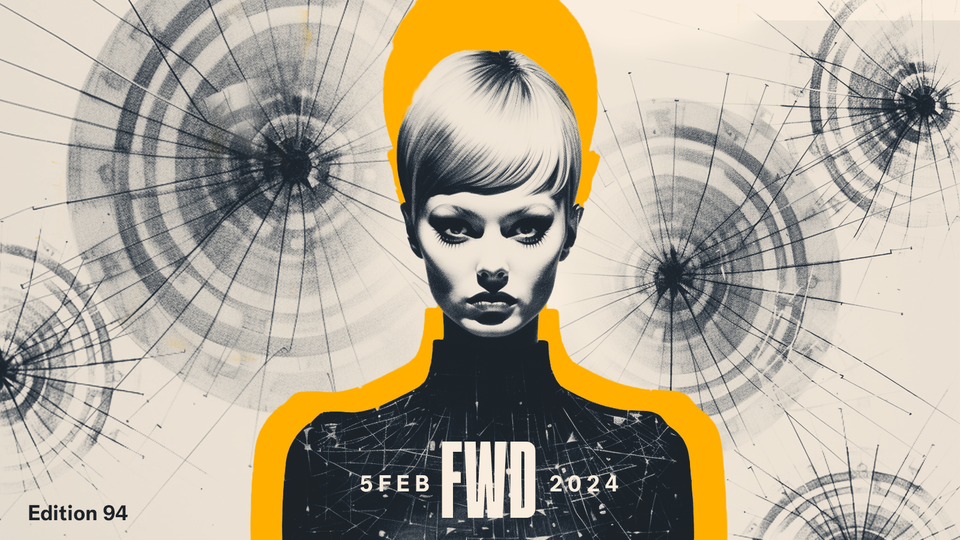
FWD - Edition 94
Zig where the world is zagging. I don't mean buy a bunker and life off the land (you do you if that's your vibe, but not what I'm talking about, specifically.) One of the main reasons I write this newsletter is to help business leaders see below the headlines, recognizing trends that don't get hashtags, but absolutely will affect their business.
Big trends are made by category incumbents, held up by media, and monetized by the masses who are desperate to feel connected to the newest, hottest thing. This collusion of the willing puts up barriers to entry for businesses like yours to actually produce value and grow marketshare. They lie to you with promises that the shiny objects of the Zeitgeist are required components on your path to growth.
It's the kind of thing that makes respected leaders growing value-forward companies start referring to tech they've had for a decade as "AI" so that they can virtue signal the technorati. The kind of thing where brilliant strategists like Scott Galloway distract you from real commerce by handwaving about DEI.
Ventures like yours cannot play by the culturemaking rules of the incumbents because those rules are built to keep the competitive gates closed. "Scale" alone is a promise that will fail again and again and again. The rules that define scale as the ultimate aim are built to keep the 2-3 incumbents with the lion's share (like trillions) of the revenue. You wouldn't know that from reading headlines or going to conferences hosted by companies who plan to make money off of your scale.
Our work is with organizations that are willing to go the radical path to define growth on their own terms, with a clear view of who their client is, orienting service model, messaging, pricing, and MOST OF ALL, growth strategy around a unique POV, not watered down version of what someone 10x them are doing.
The more you play by the rules of your 10x competitors, the more you empower them to keep you out of the game. Let's look at how it's done.

Yes... to addressing AI overlords.
Value-based ventures cannot get through the minefield of slippery slopes without being honest with ourselves about the intersection of flashy technology with bad actors. From "Deep Fakes" to grift products to people shopping themselves as "prompt engineers," there is no shortage of distraction to keep smart business leaders from sticking to smart business.
Fake dirty pictures of celebrities on the spam site formerly known as Twitter will grab headlines temporarily, but will they cause us to put our foot down on corrosive usese for GAI? Probably not.
Copyright laws are apparently incompatible with AI progress—according to OpenAI (creator of ChatGPT)—but do we still care about owning our Intellectual Capital?
(Spoiler alert: We should.)
Remember that technological upheaval correlates with other big jumps as well:
- Hyper-consolidation of capital, destroying the middle market
- Grift and charlatanism undermining trust and value
- Market bubbles, fueled by speculation, distracting investors
In these markets (like the one that we are in), level heads need to prevail. It's never about the technology. It's about the extractive and often ruthless ways it is leveraged to shift attention from value to distraction and the people who profit by doing so.

No... to Apple. (We don't get to say this very often.)
Oh Apple.
You've been such a pro-customer pantheon for so long. Who put the nail in the Facebook ads tracking you around the internet coffin? Apple. Who allowed us to control visibility into your email inbox? Apple. Who validated our moral superiority with its gorgeous blue text bubbles? Apple.
Well, not only have we had to spend the last week seeing nearly everyone (including people driving cars) wearing those ridiculous Vision Pro headsets, but our beloved Cupertino Kings are also moving into their toxic competitor era. By manipulating the latest Euro anti-monopoly policies, to make it more difficult and expensive to run apps. By setting the new gold standard for what is called "Malicious Compliance" (where you follow the letter of the law while bastardizing the spirit of it), Apple is taking its piles of cash and, instead of partnering to bring great apps to its planet of users, it's making those apps worse and more expensive.
Thanks, Tim Cook. Hope the view from those goggles is as good as you say.


Maybe... there's good news in all the bad (in real estate)?
Homebuying is as tough as it's been in decades. But perhaps, like me, you've been watching this news item since last year... when the NAR (National Assoc. of Realtors) started losing in court. The chants and cheers continued this week to call for change in the status quo of how we pay for buying and selling houses. When you're paying $20-30k in fees every time you sell a house (which you then pass on to the buyer), all, while the market continues to price out new home buyers and interest rates, are at generational highs... perhaps we are finally ready to change the game.
So while we're talking about the impenetrable game of incumbents, remember: Eventually, monopolies fall. The NAR's pricing grip on how homes are bought and sold may be the next to go. If you had asked me five years ago if the NAR was going to face billion $ of consequences for their control... I would have demurred to take that bet.
But the sentiment shift (similar to how everyone hates Bradley Cooper now) is overdue, just like how you can stop using Google to find what you don't need from the worst possible sources and stop buying Chinese-made knock-offs from Amazon.
Growth is possible.


Seriously... the one guy you don't want in your head.
I've really tried to back down my criticism of Elon. Not because he's gotten better but for my own mental health. Nick, don't let that guy take up space in your head. And now that the certified genius has announced the first use of his "Neuralink" platform to put his weird code in someone's brain, I just need to remind you all: DON'T LET THIAT GUY TAKE UP SPACE IN YOUR HEAD.
Ok, back to my regularly scheduled "not thinking about Elon" time.

Now... to finding your unique footing.
The Stability Triad (pictured below) is a tool we use in our COO dashboard for clients looking for clarity on their next move for growth. Using quant, qual, and comparative analysis, we evaluate the intersection of:
- Value Creation: How impactful the work of the business is vs their clients' other options,
- Org Design: How well the venture is built to deliver value and grow organically, and
- Community: How deeply engaged the firm is with its targeted community of clients.
Below is a recent analysis where we worked with them to surface two Transforming Vulnerabilities that are both resisting growth AND capable of making the most change.
Built for Everyone and No One happens when you do great work, but you are not managing the "for who" question carefully or strategically. It feeds a second dynamic, The Aren't We Awesome Delusion, that keeps the organization resisting growth, convinced of its diamond-in-the-rough status.
The Stability Triad surfaces dozens of these Transforming Vulnerabilities and then gives us the tools to put targeted (never generic) growth plans in place to address them.
Before you start spending growth money (marketing, sales leaders, advertising, M&A) make sure you've solved your Built-for-Growth dynamics and aren't throwing good money after bad.

Stay brains on, heart open, forward progress.
